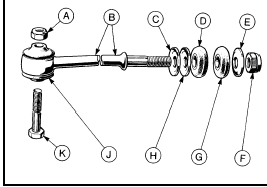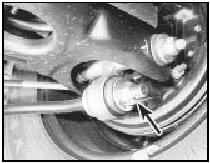Rear tie-bar (Saloon and Estate models) - removal and refitting
Removal
1 Before attempting to remove a tie-bar, note
the location of all washers and bushes. These
control the rear wheel alignment and they
must be returned to their original locations.
2 Raise the rear of the vehicle and support it with stands (see “Jacking and Vehicle Support”).
3 Unscrew and remove the pivot bolt from the eye at the front end of the tie-bar (see illustration).

12.3 Exploded view of the rear tie-bar mountings - Saloon and Estate models
A Nut
B Tie-bar
C Washer (additionalwashers
may be fitted)
D Bush
E Washer
F Nut
G Bush
H Washer (additional washers
may be fitted)
J Bush
K Pivot bolt
4 Unscrew the nut from the rear end of the tie-bar, take off the washers and bushes as the tie-bar is withdrawn and keep them in strict sequence for refitting (see illustration).

12.4 Tie-bar-to-stub axle carrier retaining nut (arrowed) - Saloon and Estate
models
Refitting 5 Renewal of the tie-bar flexible bush is quite easily carried out using sockets or distance pieces and applying pressure in the jaws of a vice.
6 Refit the tie-bar by reversing the removal operations.
See also:
Door interior handle - removal and refitting
Removal
1 Remove the door inner trim panel.
2 Where necessary for improved access, peel
back the waterproof plastic sheet from the
door.
3 Remove the two securing screws in the
case of models up ...
Fuel computer components - removal and refitting
Computer unit
Removal
1 Disconnect the battery negative terminal.
2 Undo the two instrument panel bezel
retaining screws and ease the bezel out to
release the lower clips.
3 Withdraw the compute ...
Water pump - removal and refitting
OHV engines
Note: A new gasket and suitable jointing
compound must be used on refitting.
Removal
1 Drain the cooling system as described in
Chapter 1.
2 Slacken the three water pump pulley
reta ...
